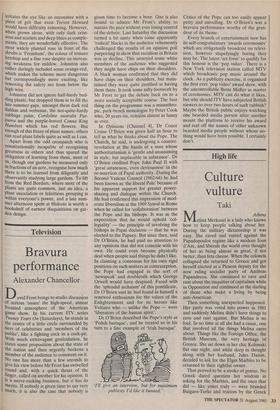Television
Bravura performance
Alexander Chancellor
David Frost brings to studio discussion of serious 'issues' the high-speed, almost frenzied atmosphere of the American game show. In his current ITV series Twenty Years On (Saturdays), he stands in the centre of a little circle surrounded by tiers of celebrities and 'members of the public', like a fighting cock in a cock-pit. With much extravagant gesticulation, he states some proposition about the state of the nation and then urgently beckons a member of the audience to comment on it. No one has more than a few seconds to give his view before Mr Frost has swivelled round and, with a quick thrust of the finger, called on another for his opinion. It is a nerve-racking business, but it has its merits. If nobody is given time to say very much, it is also the case that nobody is given time to become a bore. One is also bound to admire Mr Frost's ability to sustain the pace without ever losing control of the debate. Last Saturday the discussion turned a bit nasty when some apparently `radical' blacks in the audience vehemently challenged the results of an opinion poll purporting to show that racialism in Britain was in decline. This annoyed some white members of the audience who suggested they might have chips on their shoulders. A black woman confirmed that they did have chips on their shoulders, but main- tained they were quite justified in having them there. It took some nifty footwork by Mr Frost to get the debate back on to a more socially acceptable course. The best thing on the programme was a misanthro- pic, park-bench monologue by Peter Cook who, 20 years on, remains almost as funny as ever.
In Opinions (Channel 4), Dr Conor Cruise O'Brien was given half an hour to tell us what he thinks about the Pope. The Church, he said, is undergoing a counter- revolution at the hands of a man whose authoritarianism is 'gentle and unassuming in style, but implacable in substance'. Dr O'Brien credited Pope John Paul II with `great astuteness, even deviousness' in the re-assertion of Papal authority. During the Second Vatican Council (1962-64) he had been known as 'the liberal Pole' because of his apparent support for greater power- sharing and dialogue within the Church. He had confirmed this impression of mod- erate liberalism at the 1969 Synod in Rome when he called for 'collaboration' between the Pope and his bishops. It was in the expectation that he would uphold 'col- legiality' — the principle of involving the bishops in Papal decisions — that he was elected to the Papacy. But since then, said Dr O'Brien, he had paid no attention to any opinions that did not coincide with his own. He could even become physically deaf when people said things he didn't like. In claiming a consensus for his own rigid positions on such matters as contraception, the Pope had engaged in the sort of `newspeak' and doubletalk which George Orwell would have despised. Faced with the 'splendid archaism' of this pontificate, Dr O'Brien said he had found in himself a renewed enthusiasm for the values of the. Enlightenment and for its heroes like Voltaire who — unlike the Pope — were `liberators of the human spirit'.
Dr O'Brien described the Pope's style as `Polish baroque', and he treated us in his turn to a fine example of 'Irish baroque'.
I'll give an interview, but for maximum publicity I'd like it banned.' Critics of the Pope can too easily appear petty and snivelling. Dr O'Brien's was a bravura performance worthy of the gran- deur of its theme.
Every branch of entertainment now has its self-congratulatory 'awards ceremonies' which are obligatorily broadcast on televi- sion, however stupefyingly boring they may be. The latest 'art form' to qualify for this honour is the 'pop video'. There is a New York television station called MTV which broadcasts pop music around the clock. As a publicity exercise, it organised the first ever 'pop video' award show, with the uncontrollable Bette Midler as master of ceremonies. MTV can do what it likes, but why should ITV have subjected British viewers to over two hours of such rubbish? Maybe the British public enjoys watching one bearded media person after another mount the platform to receive his award and reel off the names of other unknown bearded media people without whom no- thing would have been possible. I certainly don't.










































 Previous page
Previous page